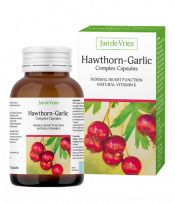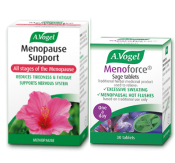Read the full video transcript below
Today's topic
Hello, and welcome to my weekly video blog. And today on A.Vogel Talks Menopause, I'm going to be discussing, ‘Can the menopause cause your blood pressure to rise?’ Now, if you like this video blog and would like to be notified of new ones each week, then please click the subscribe button below or at the end of this video.
Does oestrogen affect blood pressure?
Now, to get on to today's question. Falling oestrogen can affect your blood vessels and what happens is your oestrogen starts to fall, this can interfere with the ability of your blood vessels to dilate, to keep well open.
So your blood vessels can get slightly thicker, less mobile, and they start to constrict or narrow. And it's that narrowness that can then end up putting your blood pressure up.
Other risk factors of high blood pressure in women

But the unfortunate thing here is that as we get to menopause age, we're approaching middle age, and a whole raft of other factors can come into play as far as blood pressure is concerned.
So it can be things like your age in general, it can be lifestyle factors such as your diet, what you're eating, what you're not eating. It can be hereditary, and high blood pressure can run in families. It can also be if you had the high blood pressure issues when you were pregnant, sometimes that can then transfer itself to the menopause as well.
Stress is a huge issue. Smoking, if you start to put weight on which, again, is really common in the menopause, if you're not getting enough regular exercise, if you're having too much salt in your diet, if you're drinking too much alcohol, if you have other health issues, maybe long-term ones such as diabetes, and also if you have high cholesterol.
So all these lifestyle factors can get together and as well as your falling oestrogen can be a possible trigger for high blood pressure at this particular point.
What are the signs/symptoms of high blood pressure?
Now, what are the main signs? The problem with high blood pressure is that for a lot of people, there are no signs or symptoms at all.
It's something that can creep up on you practically unnoticed until something more serious happens. So it's really important to look after yourself well at this point which I'll go into a little bit later. But the main symptoms if you get them, and these can be confused with menopause ones as well, so just be aware of these specific ones.
If you're getting severe regular headaches, if you're getting over fatigued, if you're just tired the whole time and nothing seems to shift that particular fatigue, if you're having difficulty breathing, if you find that it's hard to, sort of, catch your breath when you do a little bit of exercise, if you start to get an irregular heartbeat, if you find that you're getting hot flushes, and I didn't realise this, this is something new for me - that hot flushes can also be, not a quite so common symptom of high blood pressure as well.
So as you can see, there's a number of symptoms that could be mistaken for menopause ones that definitely could be to do with high blood pressure. The important thing here is if you're getting any of these symptoms in any shape or form, please go to your doctor or go to your pharmacy. They can take your blood pressure. And some people find that going to a pharmacy affects them less.
There's this thing called white coat syndrome, so just the mere fact of going to get your blood pressure taken can increase your blood pressure. So some people find that going to a pharmacy is far more relaxing.
How often do you get your blood pressure checked?
In the menopause, probably about once every six months just to be on the safe side. Please don't be obsessive.
You know, we get people who buy one of these blood pressure machines and then take it every morning and the minute there's a slight little change, they're in a panic. There is no need to do this, just regular check-ups every six months is absolutely fine on the whole.
What can I do if my blood pressure is high?
So as I explained before, there are lots of things that you can do to help yourself just to minimise the risk of high blood pressure at this point.
Eat heart-healthy foods
Definitely diet, so make sure you're getting plenty of fresh foods, fresh vegetables, fruits. Watch your meat intake, purely because high fat can be a little bit of an issue as well. So make sure that if you are a meat eater, that you have lean meat, plenty of oily fish as well, and nice healthy whole grains as well.
Reduce the amount of processed foods and salt in your diet
Minimise or try and cut out processed foods because apart from anything, they tend to be really high in salt, and other chemicals, and food additives, and all these are not particularly good in the menopause generally for you. Watch your salt intake as well. The recommended daily allowance in the UK, is 6 grams a day, so try not to exceed that if you can.
Exercise regularly
Regular exercise is really important here. I know if you're fatigued, if you've got joint pain, it can be quite difficult to get this regular exercise, but even a 10, 15-minute walk a day, as brisk as you can make it, will all go towards the benefits here, so do try and get something in if you can.
Maintain a healthy weight
Weight, as I've said before is an issue and again, it's difficult in the menopause because very often, we start to put on a little bit of weight, so this is something that you maybe need to monitor quickly. If you put weight on really quickly, again, just check with the doctor about this, in case there's other health issues going on as well.
Manage stress
Manage your stress, again, you know, stress is a big one in the menopause. All sorts of things can happen here, but try to manage the stress in some way and again, that can be of great benefit.
Limit or avoid alcohol
Limit your alcohol, maybe have, you know, if you do, sort of, regular drinking or an evening glass of wine, try and have two or three days a week without it. That can be a really good help, too.
Stop smoking if you can
And stop the smoking as well because that's another factor in high blood pressure, just sort of, generally.
Herbs can help
There are herbs you can take. There's a herb called Hawthorn, it's been traditionally used for hundreds of years to help with blood pressure. The only thing is it's very slow. It may take three to six months before you start to notice any benefit, so this is not one if you have to get your blood pressure down quite quickly.
If stress is an issue, we have a lovely remedy called Passiflora Complex. This is traditionally used for, sort of, stress and anxiety. Passiflora itself, the herb Passiflora itself is known to help open up the coronary arteries, so it's a nice calmer for the heart, too. So it's a great one for this. And remember the magnesium.
Eileen's Top Tip:

Take one Jan de Vries Hawthorn-Garlic Complex capsule, twice daily. This heart healthy complex contains hawthorn and passiflora, as well as organically cultivated garlic and vitamins B1 and E.
“Hawthorne is the best herb for the heart/ circulation and i like the fact it is combined with something as beneficial as garlic.”

Avoid becoming dehydrated
And the last thing, but obviously not the least, dehydration can be a huge factor, too, so remember the water, plain water every single day.
So I hope this has been of help for you. If any of you have any comments you wish to make, or any questions about this, or anything else, then please leave some in the comments section. And I'll see you next week for another edition of A.Vogel Talks Menopause.









